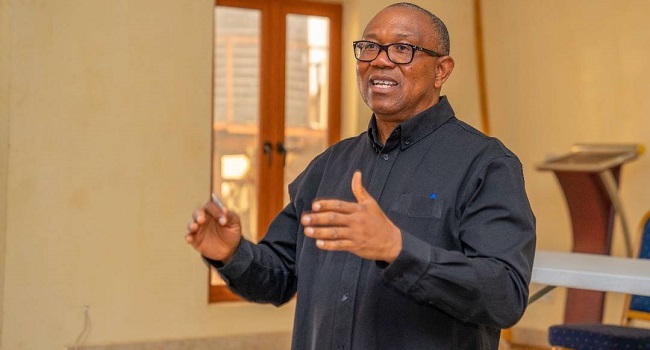Mr. Peter Obi, a former Labour Party (LP) presidential candidate, has criticized President Bola Tinubu’s administration for continuing the contentious Lagos-Calabar coastal highway project in spite of public opposition.
He expressed his displeasure that, during a period of widespread unemployment, the government is starting a project that could endanger jobs.
He asserts that it is still possible to halt the Lagos-Calabar highway project and lists national security, the eradication of poverty, access to healthcare, and education—particularly for the impoverished and disadvantaged—as critical needs.
According to reports, businesses and homes on the project’s designated right of way have been demolished. Obi called this callous and heartbreaking.
He bemoaned the fact that the demolition is wiping out jobs, ruining lifetime investments, and wiping out livelihoods.
It hurts my heart to see this thoughtless destruction. As bulldozers tear through, livelihoods are being destroyed, lifetime investments are being squandered, and jobs are being eliminated. Bulldozers are causing elderly people’s homes to topple over.
“This hurried flag-off disregards the public’s widespread outrage, particularly that of company and property owners who would be directly impacted by the project. Nobody anticipates the clamor that will follow this project as it moves closer to impoverished rural areas.
There could be a loss of thousands of jobs and investments exceeding $200 million. The leisure and hotel industry, which supports over 100,000 employment, is in danger of disappearing, as are 80 small enterprises and their 4,000 primarily young workers.
The government is starting a project that would result in job losses during a period of extreme unemployment. The present-day economic losses are mostly confined to the first kilometers in the Lagos region.
Nevertheless, the 700 km of this road would cross rural areas where the impacted people don’t have the means to speak up for themselves or use their influence. A sizable portion of the population has expressed doubts about the procedures followed before the project was approved, but the government is still unresponsive to logic and prudence.
“Several parameters have changed, even though the road’s economic value is acknowledged and its conception dates back to Tafewa Balewa’s time.” Due of the widespread poverty and insecurity, this endeavor is not as important to the country as it once was.
“It’s time to consider the timing and justification for this and related projects. The country’s economy is at its worst point in history, and hunger and poverty are growing. For most Nigerians, the necessities of life are beyond of reach.
“A dedicated government cannot start non-essential projects at this time. The current highway system is in dire need of repair, and travel is made riskier by insecurity.
A petrol tanker explosion that happened on the East-West expressway in Rivers State a few days ago claimed several lives and burned over 70 cars. The road’s terrible state, which has been ignored for years and is in dire need of repair, was the main factor in this unfortunate tragedy.
In addition to our health institutions’ inadequate resources, our economy is faltering. There are about fifty federal roadway projects that have been abandoned nationwide; why start a costly new project?
“National security, the eradication of poverty, healthcare, and education—especially for the impoverished and disadvantaged—are critical needs. The project to build the Lagos-Calabar highway can still be abandoned.
“We are unable to finance another costly project that is shelved. Nigeria has more pressing and vital development requirements. We don’t require adventures in landscape decoration.
